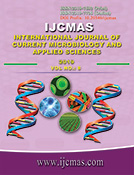


 National Academy of Agricultural Sciences (NAAS)
National Academy of Agricultural Sciences (NAAS)

|
PRINT ISSN : 2319-7692
Online ISSN : 2319-7706 Issues : 12 per year Publisher : Excellent Publishers Email : editorijcmas@gmail.com / submit@ijcmas.com Editor-in-chief: Dr.M.Prakash Index Copernicus ICV 2018: 95.39 NAAS RATING 2020: 5.38 |
Studies were conducted on Carnation (Dianthus caryophyllus L.) to find out the effect of integrated inoculation of potent native isolates of Arbuscular mycorrhizal fungi (AM fungi) and Azotobacter chroocococum with other approaches of management like cultural and biological methods in solarized soil on the incidence of wilt caused by Fusarium oxysporum f.sp. dianthi (Prill. and Del.). Initially, organic amendments, botanicals and bio-control agents were evaluated against wilt to find out the best treatments. Among amendments, neem cake was found most effective with 75.0 per cent reduction in the wilt incidence. Different fungicides, botanicals, bio-pesticides and bio-control agents were also evaluated against wilt by dip treatment of unrooted carnation cuttings. Bavistin among fungicides, Neemazal among botanicals and Trichoderma viride among bio-control agents were found effective with 100.0, 71.1 and 93.6 per cent reduction in the wilt incidence. Based on the best individual treatments, fourteen treatment combinations were evaluated in solarized and unsolarized plots for their efficacy against the disease. Among different treatments, root dip of cuttings in Bavistin (0.1%), soil amendment with Neemcake (1kg/m2), root inoculation with culture of AM fungi and A. chroococcum (5g culture/ plant) and soil application of T. viride formulation (10g/m2) in solarized soil was found most effective with 97.1 per cent reduction in the wilt incidence. This treatment combination also resulted in maximum increase of 50.97, 100.4, 39.2, 57.3, per cent in plant height, number of flowers per plant, flower size and length of flowering stem, respectively in comparison to control.
 |
 |
 |
 |
 |